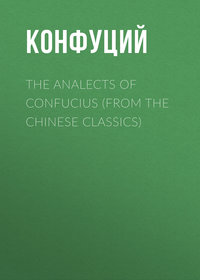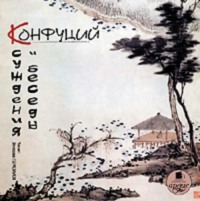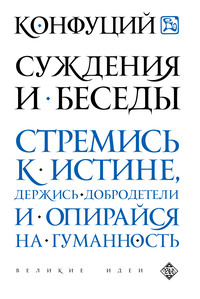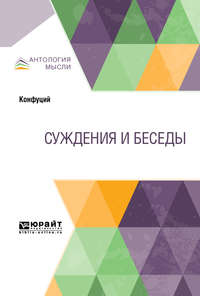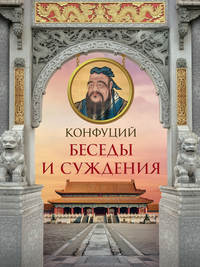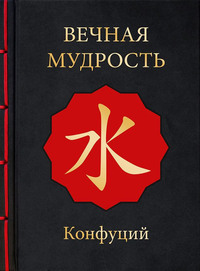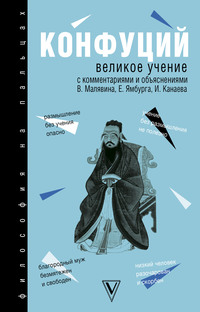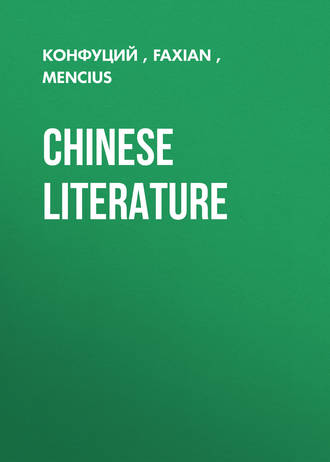 полная версия
полная версияChinese Literature
Fan Ch'i, strolling with him over the ground below the place of the rain-dance, said to him, "I venture to ask how to raise the standard of virtue, how to reform dissolute habits, and how to discern what is illusory?"
"Ah! a good question indeed!" he exclaimed. "Well, is not putting duty first, and success second, a way of raising the standard of virtue? And is not attacking the evil in one's self, and not the evil which is in others, a way of reforming dissolute habits? And as to illusions, is not one morning's fit of anger, causing a man to forget himself, and even involving in the consequences those who are near and dear to him—is not that an illusion?"
The same disciple asked him what was meant by "a right regard for one's fellow-creatures." He replied, "It is love to man."
Asked by him again what was meant by wisdom, he replied, "It is knowledge of man."
Fan Ch'i did not quite grasp his meaning.
The Master went on to say, "Lift up the straight, set aside the crooked, so can you make the crooked straight."
Fan Ch'i left him, and meeting with Tsz-hiá he said, "I had an interview just now with the Master, and I asked him what wisdom was. In his answer he said, 'Lift up the straight, set aside the crooked, and so can you make the crooked straight.' What was his meaning?"
"Ah! words rich in meaning, those," said the other. "When Shun was emperor, and was selecting his men from among the multitude, he 'lifted up' Káu-yáu; and men devoid of right feelings towards their kind went far away. And when T'ang was emperor, and chose out his men from the crowd, he 'lifted up' I-yin—with the same result."
Tsz-kung was consulting him about a friend. "Speak to him frankly, and respectfully," said the Master, "and gently lead him on. If you do not succeed, then stop; do not submit yourself to indignity."
The learned Tsang observed, "In the society of books the 'superior man' collects his friends; in the society of his friends he is furthering good-will among men."
BOOK XIII
Answers on the Art of Governing—Consistency
Tsz-lu was asking about government. "Lead the way in it," said the Master, "and work hard at it."
Requested to say more, he added, "And do not tire of it."
Chung-kung, on being made first minister to the Chief of the Ki family, consulted the Master about government, and to him he said, "Let the heads of offices be heads. Excuse small faults. Promote men of sagacity and talent."
"But," he asked, "how am I to know the sagacious and talented, before promoting them?"
"Promote those whom you do know," said the Master.
"As to those of whom you are uncertain, will others omit to notice them?"
Tsz-lu said to the Master, "As the prince of Wei, sir, has been waiting for you to act for him in his government, what is it your intention to take in hand first?"
"One thing of necessity," he answered—"the rectification of terms."
"That!" exclaimed Tsz-lu. "How far away you are, sir! Why such rectification?"
"What a rustic you are, Tsz-lu!" rejoined the Master. "A gentleman would be a little reserved and reticent in matters which he does not understand. If terms be incorrect, language will be incongruous; and if language be incongruous, deeds will be imperfect. So, again, when deeds are imperfect, propriety and harmony cannot prevail, and when this is the case laws relating to crime will fail in their aim; and if these last so fail, the people will not know where to set hand or foot. Hence, a man of superior mind, certain first of his terms, is fitted to speak; and being certain of what he says can proceed upon it. In the language of such a person there is nothing heedlessly irregular—and that is the sum of the matter."
Fan Ch'i requested that he might learn something of husbandry. "For that." said the Master, "I am not equal to an old husbandman." Might he then learn something of gardening? he asked. "I am not equal to an old gardener." was the reply.
"A man of little mind, that!" said the Master, when Fan Ch'i had gone out. "Let a man who is set over the people love propriety, and they will not presume to be disrespectful. Let him be a lover of righteousness, and they will not presume to be aught but submissive. Let him love faithfulness and truth, and they will not presume not to lend him their hearty assistance. Ah, if all this only were so, the people from all sides would come to such a one, carrying their children on their backs. What need to turn his hand to husbandry?
"Though a man," said he, "could hum through the Odes—the three hundred—yet should show himself unskilled when given some administrative work to do for his country; though he might know much of that other lore, yet if, when sent on a mission to any quarter, he could answer no question personally and unaided, what after all is he good for?
"Let a leader," said he, "show rectitude in his own personal character, and even without directions from him things will go well. If he be not personally upright, his directions will not be complied with."
Once he made the remark, "The governments of Lu and of Wei are in brotherhood."
Of King, a son of the Duke of Wei, he observed that "he managed his household matters well. On his coming into possession, he thought, 'What a strange conglomeration!'—Coming to possess a little more, it was, 'Strange, such a result!' And when he became wealthy, 'Strange, such elegance!'"
The Master was on a journey to Wei, and Yen Yu was driving him. "What multitudes of people!" he exclaimed. Yen Yu asked him, "Seeing they are so numerous, what more would you do for them?"
"Enrich them," replied the Master.
"And after enriching them, what more would you do for them?"
"Instruct them."
"Were any one of our princes to employ me," he said, "after a twelvemonth I might have made some tolerable progress;"
Again, "How true is that saying, 'Let good men have the management of a country for a century, and they would be adequate to cope with evil-doers, and thus do away with capital punishments,'"
Again, "Suppose the ruler to possess true kingly qualities, then surely after one generation there would be good-will among men."
Again, "Let a ruler but see to his own rectitude, and what trouble will he then have in the work before him? If he be unable to rectify himself, how is he to rectify others?"
Once when Yen Yu was leaving the Court, the Master accosted him. "Why so late?" he asked. "Busy with legislation," Yen replied. "The details of it," suggested the Master; "had it been legislation, I should have been there to hear it, even though I am not in office."
Duke Ting asked if there were one sentence which, if acted upon, might have the effect of making a country prosperous.
Confucius answered, "A sentence could hardly be supposed to do so much as that. But there is a proverb people use which says, 'To play the prince is hard, to play the minister not easy.' Assuming that it is understood that 'to play the prince is hard,' would it not be probable that with that one sentence the country should be made to prosper?"
"Is there, then," he asked, "one sentence which, if acted upon, would have the effect of ruining a country?"
Confucius again replied, "A sentence could hardly be supposed to do so much as that. But there is a proverb men have which says, 'Not gladly would I play the prince, unless my words were ne'er withstood.' Assuming that the words were good, and that none withstood them, would not that also be good? But assuming that they were not good, and yet none withstood them, would it not be probable that with that one saying he would work his country's ruin?"
When the Duke of Sheh consulted him about government, he replied, "Where the near are gratified, the far will follow."
When Tsz-hiá became governor of Kü-fu, and consulted him about government, he answered, "Do not wish for speedy results. Do not look at trivial advantages. If you wish for speedy results, they will not be far-reaching; and if you regard trivial advantages you will not successfully deal with important affairs."
The Duke of Sheh in a conversation with Confucius said, "There are some straightforward persons in my neighborhood. If a father has stolen a sheep, the son will give evidence against him."
"Straightforward people in my neighborhood are different from those," said Confucius. "The father will hold a thing secret on his son's behalf, and the son does the same for his father. They are on their way to becoming straightforward."
Fan Ch'i was asking him about duty to one's fellow-men. "Be courteous," he replied, "in your private sphere; be serious in any duty you take in hand to do; be leal-hearted in your intercourse with others. Even though you were to go amongst the wild tribes, it would not be right for you to neglect these duties."
In answer to Tsz-kung, who asked, "how he would characterize one who could fitly be called 'learned official,'" the Master said, "He may be so-called who in his private life is affected with a sense of his own unworthiness, and who, when sent on a mission to any quarter of the empire, would not disgrace his prince's commands."
"May I presume," said his questioner, "to ask what sort you would put next to such?"
"Him who is spoken of by his kinsmen as a dutiful son, and whom the folks of his neighborhood call' good brother.'"
"May I still venture to ask whom you would place next in order?"
"Such as are sure to be true to their word, and effective in their work—who are given to hammering, as it were, upon one note—of inferior calibre indeed, but fit enough, I think, to be ranked next."
"How would you describe those who are at present in the government service?"
"Ugh! mere peck and panier men!—not worth taking into the reckoning."
Once he remarked, "If I cannot get via media men to impart instruction to, then I must of course take the impetuous and undisciplined! The impetuous ones will at least go forward and lay hold on things; and the undisciplined have at least something in them which needs to be brought out."
"The Southerners," said he, "have the proverb, 'The man who sticks not to rule will never make a charm-worker or a medical man,' Good!—'Whoever is intermittent in his practise of virtue will live to be ashamed of it.' Without prognostication," he added, "that will indeed be so."
"The nobler-minded man," he remarked, "will be agreeable even when he disagrees; the small-minded man will agree and be disagreeable."
Tsz-kung was consulting him, and asked, "What say you of a person who was liked by all in his village?"
"That will scarcely do," he answered.
"What, then, if they all disliked him?"
"That, too," said he, "is scarcely enough. Better if he were liked by the good folk in the village, and disliked by the bad."
"The superior man," he once observed, "is easy to serve, but difficult to please. Try to please him by the adoption of wrong principles, and you will fail. Also, when such a one employs others, he uses them according to their capacity. The inferior man is, on the other hand, difficult to serve, but easy to please. Try to please him by the adoption of wrong principles, and you will succeed. And when he employs others he requires them to be fully prepared for everything."
Again, "The superior man can be high without being haughty. The inferior man can be haughty if not high."
"The firm, the unflinching, the plain and simple, the slow to speak," said he once, "are approximating towards their duty to their fellow-men."
Tsz-lu asked how he would characterize one who might fitly be called an educated gentleman. The master replied, "He who can properly be so-called will have in him a seriousness of purpose, a habit of controlling himself, and an agreeableness of manneramong his friends and associates the seriousness and the self-control, and among his brethren the agreeableness of manner."
"Let good and able men discipline the people for seven years," said the Master, "and after that they may do to go to war."
But, said he, "To lead an undisciplined people to war—that I call throwing them away."
BOOK XIV
Good and Bad Government—Miscellaneous Sayings
Yuen Sz asked what might be considered to bring shame on one.
"Pay," said the Master; "pay—ever looking to that, whether the country be well or badly governed."
"When imperiousness, boastfulness, resentments, and covetousness cease to prevail among the people, may it be considered that mutual good-will has been effected?" To this question the Master replied, "A hard thing overcome, it may be considered. But as to the mutual good-will—I cannot tell."
"Learned officials," said he, "who hanker after a home life, are not worthy of being esteemed as such."
Again, "In a country under good government, speak boldly, act boldly. When the land is ill-governed, though you act boldly, let your words be moderate."
Again, "Men of virtue will needs be men of words—will speak out—but men of words are not necessarily men of virtue. They who care for their fellow-men will needs be bold, but the bold may not necessarily be such as care for their fellow-men."
Nan-kung Kwoh, who was consulting Confucius, observed respecting I, the skilful archer, and Ngau, who could propel a boat on dry land, that neither of them died a natural death; while Yu and Tsih, who with their own hands had labored at husbandry, came to wield imperial sway.
The Master gave him no reply. But when the speaker had gone out he exclaimed, "A superior man, that! A man who values virtue, that!"
"There have been noble-minded men," said he, "who yet were wanting in philanthropy; but never has there been a small-minded man who had philanthropy in him."
He asked, "Can any one refuse to toil for those he loves? Can any one refuse to exhort, who is true-hearted?"
Speaking of the preparation of Government Notifications in his day he said, "P'i would draw up a rough sketch of what was to be said; the Shishuh then looked it carefully through and put it into proper shape; Tsz-yu next, who was master of the ceremonial of State intercourse, improved and adorned its phrases; and Tsz-ch'an of Tung-li added his scholarly embellishments thereto."
To some one who asked his opinion of the last-named, he said, "He was a kind-hearted man." Asked what he thought of Tsz-si, he exclaimed, "Alas for him! alas for him!"—Asked again about Kwan Chung, his answer was, "As to him, he once seized the town of P'in with its three hundred families from the Chief of the Pih clan, who, afterwards reduced to living upon coarse rice, with all his teeth gone, never uttered a word of complaint."
"It is no light thing," said he, "to endure poverty uncomplainingly; and a difficult thing to bear wealth without becoming arrogant."
Respecting Mang Kung-ch'oh, he said that, while he was fitted for something better than the post of chief officer in the Cháu or Wei families, he was not competent to act as minister in small States like those of T'ang or Sieh.
Tsz-lu asked how he would describe a perfect man. He replied, "Let a man have the sagacity of Tsang Wu-chung, the freedom from covetousness of Kung-ch'oh, the boldness of Chwang of P'in, and the attainments in polite arts of Yen Yu; and gift him further with the graces taught by the 'Books of Rites' and 'Music'—then he may be considered a perfect man. But," said he, "what need of such in these days? The man that may be regarded as perfect now is the one who, seeing some advantage to himself, is mindful of righteousness; who, seeing danger, risks his life; and who, if bound by some covenant of long standing, never forgets its conditions as life goes on."
Respecting Kung-shuh Wan, the Master inquired of Kung-ming Kiá, saying, "Is it true that your master never speaks, never laughs, never takes aught from others?"
"Those who told you that of him," said he, "have gone too far. My master speaks when there is occasion to do so, and men are not surfeited with his speaking. When there is occasion to be merry too, he will laugh, but men have never overmuch of his laughing. And whenever it is just and right to take things from others, he will take them, but never so as to allow men to think him burdensome." "Is that the case with him?" said the Master. "Can it be so?"
Respecting Tsang Wu-chung the Master said, "When he sought from Lu the appointment of a successor to him, and for this object held on to his possession of the fortified city of Fang—if you say he was not then using constraint towards his prince, I must refuse to believe it."
Duke Wan of Tsin he characterized as "artful but not upright"; and Duke Hwan of Ts'i as "upright but not artful."
Tsz-lu remarked, "When Duke Hwan caused his brother Kiu to be put to death, Shau Hwuh committed suicide, but Kwan Chung did not. I should say he was not a man who had much good-will in him—eh?"
The Master replied, "When Duke Hwan held a great gathering of the feudal lords, dispensing with military equipage, it was owing to Kwan Chung's energy that such an event was brought about. Match such good-will as that—match it if you can."
Tsz-kung then spoke up. "But was not Kwan Chung wanting in good-will? He could not give up his life when Duke Hwan caused his brother to be put to death. Besides, he became the duke's counsellor."
"And in acting as his counsellor put him at the head of all the feudal lords," said the Master, "and unified and reformed the whole empire; and the people, even to this day, reap benefit from what he did. Had it not been for him we should have been going about with locks unkempt and buttoning our jackets (like barbarians) on the left. Would you suppose that he should show the same sort of attachment as exists between a poor yokel and his one wife—that he would asphyxiate himself in some sewer, leaving no one the wiser?"
Kung-shuh Wan's steward, who became the high officer Sien, went up accompanied by Wan to the prince's hall of audience.
When Confucius heard of this he remarked, "He may well be esteemed a 'Wan,'"
The Master having made some reference to the lawless ways of Duke Ling of Wei, Ki K'ang said to him, "If he be like that, how is it he does not ruin his position?"
Confucius answered, "The Chung-shuh, Yu, is charged with the entertainment of visitors and strangers; the priest T'o has charge of the ancestral temple; and Wang-sun Kiá has the control of the army and its divisions:—with men such as those, how should he come to ruin?"
He once remarked, "He who is unblushing in his words will with difficulty substantiate them."
Ch'in Shing had slain Duke Kien. Hearing of this, Confucius, after performing his ablutions, went to Court and announced the news to Duke Ngai, saying, "Ch'in Hang has slain his prince. May I request that you proceed against him?"
"Inform the Chiefs of the Three Families," said the duke.
Soliloquizing upon this, Confucius said, "Since he uses me to back his ministers,30 I did not dare not to announce the matter to him; and now he says, 'Inform the Three Chiefs.'"
He went to the Three Chiefs and informed them, but nothing could be done. Whereupon again he said, "Since he uses me to back his ministers, I did not dare not to announce the matter."
Tsz-lu was questioning him as to how he should serve his prince.
"Deceive him not, but reprove him," he answered.
"The minds of superior men," he observed, "trend upwards; those of inferior men trend downwards."
Again, "Students of old fixed their eyes upon themselvesnow they learn with their eyes upon others."
Kü Pih-yuh despatched a man with a message to Confucius. Confucius gave him a seat, and among other inquiries he asked, "How is your master managing?" "My master," he replied, "has a great wish to be seldom at fault, and as yet he cannot manage it."
"What a messenger!" exclaimed he admiringly, when the man went out.
"What a messenger!"
"When not occupying the office," was a remark of his, "devise not the policy."
The Learned Tsang used to say, "The thoughts of the 'superior man' do not wander from his own office."
"Superior men," said the Master, "are modest in their words, profuse in their deeds."
Again, "There are three attainments of the superior man which are beyond me—the being sympathetic without anxiety, wise without scepticism, brave without fear."
"Sir," said Tsz-kung, "that is what you say of yourself."
Whenever Tsz-kung drew comparisons from others, the Master would say, "Ah, how wise and great you must have become! Now I have no time to do that."
Again, "My great concern is, not that men do not know me, but that they cannot."
Again, "If a man refrain from making preparations against his being imposed upon, and from counting upon others' want of good faith towards him, while he is foremost to perceive what is passing—surely that is a wise and good man."
Wi-shang Mau accosted Confucius, saying, "Kiu, how comes it that you manage to go perching and roosting in this way? Is it not because you show yourself so smart a speaker, now?"
"I should not dare do that," said Confucius. "Tis that I am sick of men's immovableness and deafness to reason."
"In a well-bred horse," said he, "what one admires is not its speed, but its good points."
Some one asked, "What say you of the remark, 'Requite enmity with kindness'?"
"How then," he answered, "would you requite kindness? Requite enmity with straightforwardness, and kindness with kindness."
"Ah! no one knows me!" he once exclaimed.
"Sir," said Tsz-kung, "how comes it to pass that no one knows you?"
"While I murmur not against Heaven," continued the Master, "nor cavil at men; while I stoop to learn and aspire to penetrate into things that are high; yet 'tis Heaven alone knows what I am."
Liáu, a kinsman of the duke, having laid a complaint against Tsz-lu before Ki K'ang, an officer came to Confucius to inform him of the fact, and he added, "My lord is certainly having his mind poisoned by his kinsman Liáu, but through my influence perhaps we may yet manage to see him exposed in the marketplace or the Court."
"If right principles are to have their course, it is so destined," said the Master; "if they are not to have their course, it is so destined. What can Liáu do against Destiny?"
"There are worthy men," said the Master, "fleeing from the world; some from their district; some from the sight of men's looks; some from the language they hear."
"The men who have risen from their posts and withdrawn in this manner are seven in number."
Tsz-lu, having lodged overnight in Shih-mun, was accosted by the gate-keeper in the morning. "Where from?" he asked. "From Confucius," Tsz-lu responded. "That is the man," said he, "who knows things are not up to the mark, and is making some ado about them, is it not?"
When the Master was in Wei, he was once pounding on the musical stone, when a man with a basket of straw crossed his threshold, and exclaimed, "Ah, there is a heart that feels! Aye, drub the stone!" After which he added, "How vulgar! how he hammers away on one note!—and no one knows him, and he gives up, and all is over!
Be it deep, our skirts we'll raise to the waist, —Or shallow, then up to the knee,'""What determination!" said the Master. "Yet it was not hard to do."
Tsz-chang once said to him, "In the 'Book of the Annals' it is stated that while Káu-tsung was in the Mourning Shed he spent the three years without speaking. What is meant by that?"
"Why must you name Káu-tsung?" said the Master. "It was so with all other ancient sovereignswhen one of them died, the heads of every department agreed between themselves that they should give ear for three years to the Prime Minister."
"When their betters love the Rules, then the folk are easy tools," was a saying of the Master.
Tsz-lu having asked what made a "superior man," he answered,"Self-culture, with a view to becoming seriously-minded.""Nothing more than that?" said he.
"Self-culture with a view to the greater satisfaction of others," added the Master.
"That, and yet no more?"
"Self-culture with a view to the greater satisfaction of all the clans and classes," he again added. "Self-culture for the sake of all—a result that, that would almost put Yau and Shun into the shade!"
To Yuen Jang,31 who was sitting waiting for him in a squatting (disrespectful) posture, the Master delivered himself as follows"The man who in his youth could show no humility or subordination, who in his prime misses his opportunity, and who when old age comes upon him will not die—that man is a miscreant." And he tapped him on the shin with his staff.


